God

And that is the point of Believer — to use Aslan’s hip-deep immersion in some obscure corner of the faith world to show that people of different religious persuasions — even the ones generally considered marginal, dangerous, or just plain “out there” — have more in common than they know.

We do not believe the same thing. We are Abrahamic siblings, yes, and deeply connected in important ways, but our faiths, theology, practice, histories, views on God are different.
But love.
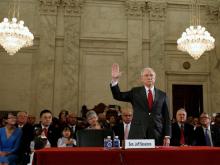
Senator Jeff Sessions of Alabama recently raised eyebrows during his confirmation hearing for attorney general when he expressed doubts that secular people respected the truth as much as did those with religious convictions. Even as he insisted that there should be no religious tests for holding public office, Sessions was queasy about the potential dangers of the secular worldview.
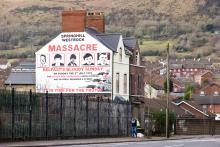
When our desire for security is so great that it diminishes our humanity and our capacity, or willingness, to see the world through the eyes of another, we lose a precious part of who we were designed to be. Our hearts are hardened, calcified.
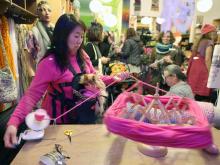
On Jan. 21, I’ll join thousands in D.C. for the Women’s March on Washington. My first stop will be at a local congregation, one of several hosting a prayer service and warming station for marchers. I’m an anti-racist, feminist, Christian, and for me, faith will be part of the day.
I’ve been disappointed with Christian silence, and even active resistance, to social justice imperatives, but my commitments to justice stem from my faith, and that’s why I march.

“This magnificent grace, this expansive grace, this ‘Amazing Grace’ calls me to reflect. And it calls me to pray. It calls me to ask God for forgiveness, for the times that I’ve not shown grace to others, those times that I’ve fallen short.”

If I’ve learned anything since my time in Rome, it’s that people — not just Catholics — are hungering to connect peace with justice. This is why those of us who traveled to Rome just before the election, accompanied by Stockton, Calif., Bishop Stephen Blaire, and Houma-Thibodaux, La., Bishop Shelton Fabre, are preparing for a regional WMPM meeting in Modesto, Calif., in February.
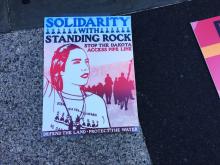
Dec. 4 was a beautiful reminder, in the long struggle for justice, that, no matter how long we wait, God hears our cry. And love and justice will win.
A few weeks ago, Chief Arvol Looking Horse issued an invitation to clergy and faith leaders to stand in solidarity with the people of Standing Rock. He said he was hoping maybe 100 would respond. But I joined thousands, in a procession of faith leaders, to gather around the sacred fire at the Oceti Sakowin Camp at Standing Rock.
I knew something special was happening here.
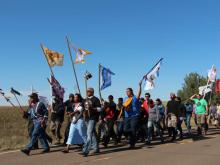
Does Pope Francis have a position on the Dakota Access Pipeline?
That’s one question he hasn’t been asked, and he might demur if pressed on such a specific issue. But in his landmark encyclical on the environment published last year, and in other statements, Francis has strongly supported arguments of the Native American-led resistance movement on three core issues: indigenous rights, water rights and protection of creation.

On Nov. 26, Art Sisneros, a Texas presidential elector and Republican, announced in a blog post his resignation from the Electoral College and the reason behind his decision. “I do not see how Donald Trump is biblically qualified to serve in the office of the Presidency,” Sisneros wrote.

Fuller Theological Seminary has joined a growing list of schools where administrators are being pressed by students, alumni, and faculty for designation as a sanctuary campus.
In the aftermath of Donald Trump’s election as president, some campuses are considering the moniker “sanctuary campus,” which generally means that the university will not willingly give the government information about their students, staff, or faculty who are undocumented immigrants.
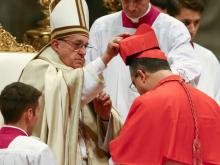
At a solemn ceremony in St. Peter’s Basilica, to elevate 17 new cardinals, Pope Francis, on Nov. 19, delivered a ringing plea to the world, and his own Catholic Church, to reject “the virus of polarization and animosity," and the growing temptation to “demonize” those who are different.
The pontiff’s address came across as a powerful, gospel-based indictment of the populist and nationalist anger roiling countries around the world, displayed most recently by the stunning election of Donald Trump as president of the U.S.
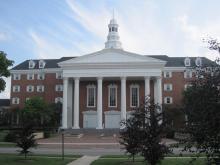
Exit polls suggest 81 percent of white evangelicals voted for President-elect Donald Trump.
But support for Trump may have been less decisive on Christian college campuses, where most students are also white evangelicals.
A Washington Post/ABC News poll, before the election, found the views of younger adults do not align with some older ones, when it comes to their beliefs about Trump supporters.
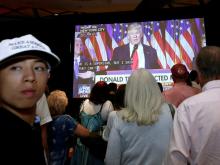
In the aftermath of this presidential election, I can’t help but see striking similarities between what happened inside the religious cult of my childhood and what played out for us, in the political cult of personality.
Here was the larger-than-life leader drawing followers to himself, despite the facts of his poor character, lack of experience, and even despite the fact that media, pundits, and pollsters claimed he wouldn’t — couldn’t — win.
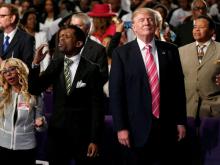
I fear now, as I have feared for months, the impact of his presidency on vulnerable people — including the white and working-class voters in places like my home state of Ohio who lent him their support.
Christians always have disagreements about policy proposals or party platforms during election seasons. But this year, I wonder how white Christians who read the same Scriptures and hold many of the same beliefs that I do could support a man who in word and deed has flaunted the core teachings of our faith.
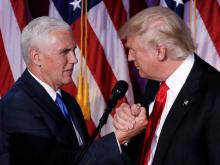
As it is, white evangelicals made up a little more than a quarter of those who turned out to cast their ballots. And by winning 81 percent of their vote, Trump was assured the presidency.
Now, evangelicals are expecting much in return from a president-elect who did not mention God in his victory speech, who was “strongly” in favor of abortion rights until he was against them, who has said he does not believe in repentance, who has made lewd comments admitting to sexual assault.
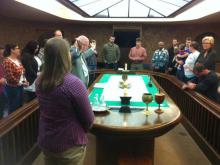
The idea for an Election Day church service came to the pastor as he was pouring juice into little plastic cups.
Mark Schloneger was preparing for Communion that day in 2008, in the kitchen of Waynesboro Mennonite Church in Virginia’s Shenandoah Valley. The phone rang. It was a robocall from Sarah Palin, the GOP’s vice presidential nominee that year. She was imploring Christians to go to the polls, vote for her party, and take back the country.

We write to you on All Saints Day to update you on the situation in Iraq. Remembering the Christians who were killed in 2009 while attending Mass at Our Lady of Deliverance Church in Baghdad. That was the beginning of harder times to all Christians in Iraq.
It has been two years and four months since we left Nineveh Plain. It has been long time of displacement, of humiliation, of exile. However, people always lived in hope of God’s mercy to return and go back home. We believed that God will not fail us.
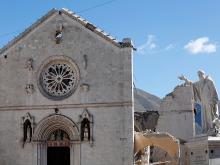
The strongest earthquake to strike Italy in more than three decades claimed no lives, but struck at the heart of the country’s vast religious and cultural heritage.
The Oct. 30 quake, which measured 6.6 magnitude according to the U.S. Geological Survey, was stronger than the one that killed almost 300 people on Aug. 24, and it struck a region already shaken by tremors last week.

After quietly removing panes bearing the Confederate flag from its stained-glass windows, leaders of the Washington National Cathedral are now wondering what to do about remaining images of Confederate generals Robert E. Lee and Stonewall Jackson.
"How can you justify having those windows in a house of God?" challenged Riley Temple, a former board member of the Washington National Cathedral's foundation.